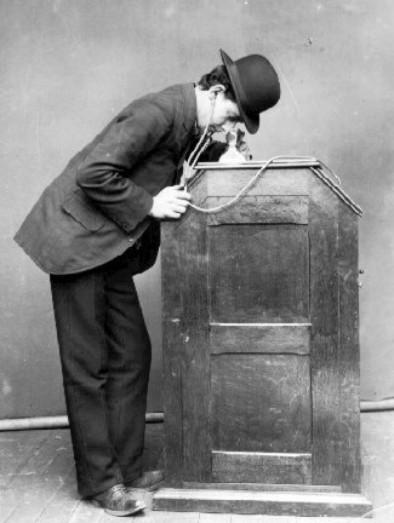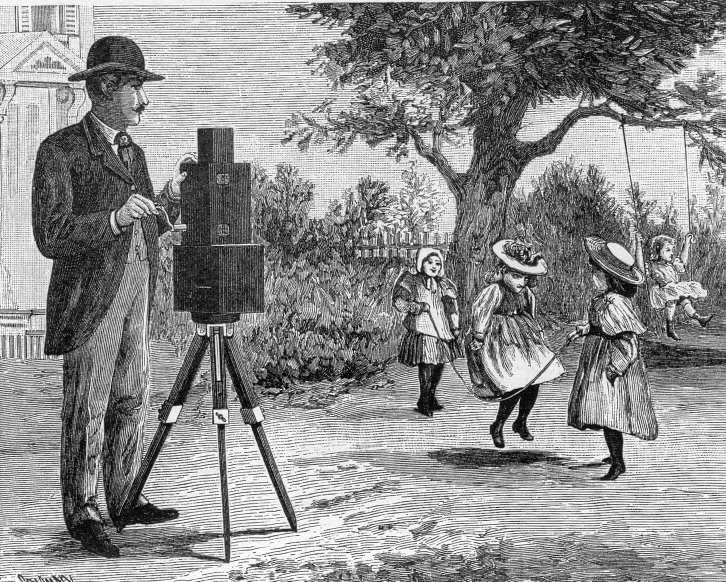THE LUMIERE BROTHERS
Auguste and Louis were born in Besancon, france in 1862 and 1864, their father was well known Lyons based portrait painter Anthonie Lumiere. They were both sent to technical college and were technical minded.
At the age of seventeen Louis developed a ''new dry'' plate process in 1881, it became known as ''Etiquette Bleue" process. This development boosted his father's business and a factory was built for manufacturing plates in the Monplaisir quarter of the Lyons suburbs. In 1894, because of their father's business success he was invited to a demonstration of Edison's peephole kinetoscope in Paris. He was excited by what he saw and returned to lyons with a piece of kinetoscope film given to him by one of Edison's concessionaires. The brothers worked of the kinetoscope film their father gave in order to produced a better, cheaper and available to all viewing pleasure.
 |
| A man viewing through a Kinescope |
By early 1895 during the French third republic and the reign of President Felix Faure, the brothers had invented their own device combining camera with printer and projector called Cinematographe. The was patented on february 13th 1895, it was much smaller than Edison's Kinetograph and was hand cranked.
 |
| A man cranking the cinematographe |
The lumieres used a film speed of 16 frame per seconds, much slower compare with Edison's 48 fps- this meant that less film was used and also clatter and grinding associated with Edison's device was reduced, each film is 17 meters long which hand cranked through a projector runs approximately 50 seconds. Louis's decision to incorporate the principle of intermittent movement using a device similar to that found in sewing machines, this was something Edison had rejected as he struggle to perfect projection using continuous movement. The brothers keeps their invention guarded secret with Auguste organising private screening.
The first screening was in paris on December 28 1895 at Salon Indien du Grand Cafe, a historical place and time of the first ever film screening in front of large audience with the Cinematographe that could project images to the wall. One the ten film showed was famous- sortie des usines lumiere a Lyon( workers leaving the Lumiere factory).
La Sortie de usines Lumière
LIST OF FILM IN EARLY DAYS OF CINEMATOGRAPH
La Sortie de usines Lumière (1894)
La Voltige (1895)
La Peche aux poissons rouges (1895)
La Debarquement du congres de photographie a Lyons (1895)
Les Forgerons (1895)
L’ Arroseur arrose (1895) Repas de bebe (1895)
Place des Cordeliers a Lyon (1895)
La Mer (1895)
La Peche aux poissons rouges (1895)
La Debarquement du congres de photographie a Lyons (1895)
Les Forgerons (1895)
L’ Arroseur arrose (1895) Repas de bebe (1895)
Place des Cordeliers a Lyon (1895)
La Mer (1895)
Louis photographed the world around him and some of his first
films were 'actuality' films, like the workers leaving the factory. The
brothers began to open theatres to show their films (which became known as
cinemas). In the first four months of 1896 they had opened Cinématographe
theatres in London, Brussels, Belgium and New York.
Their catalogues grew from 358 titles in 1897 to 1000 in 1898 to
2113 in 1903; although out of the 2113 titles in the 1903 catalogue, less than
50 were the brothers. The rest were taken by other operators like Promio,
Doublier and Mesguich. In 1900 the brothers projected a film on a huge 99 x 79
foot screen at the Paris Exposition, after which they decided to curtail their
film exhibitions and devote their time to the manufacture and sale of their
inventions.
In 1907 they produced the first practical colour photography
process, the Autochrome Plate.



No comments:
Post a Comment